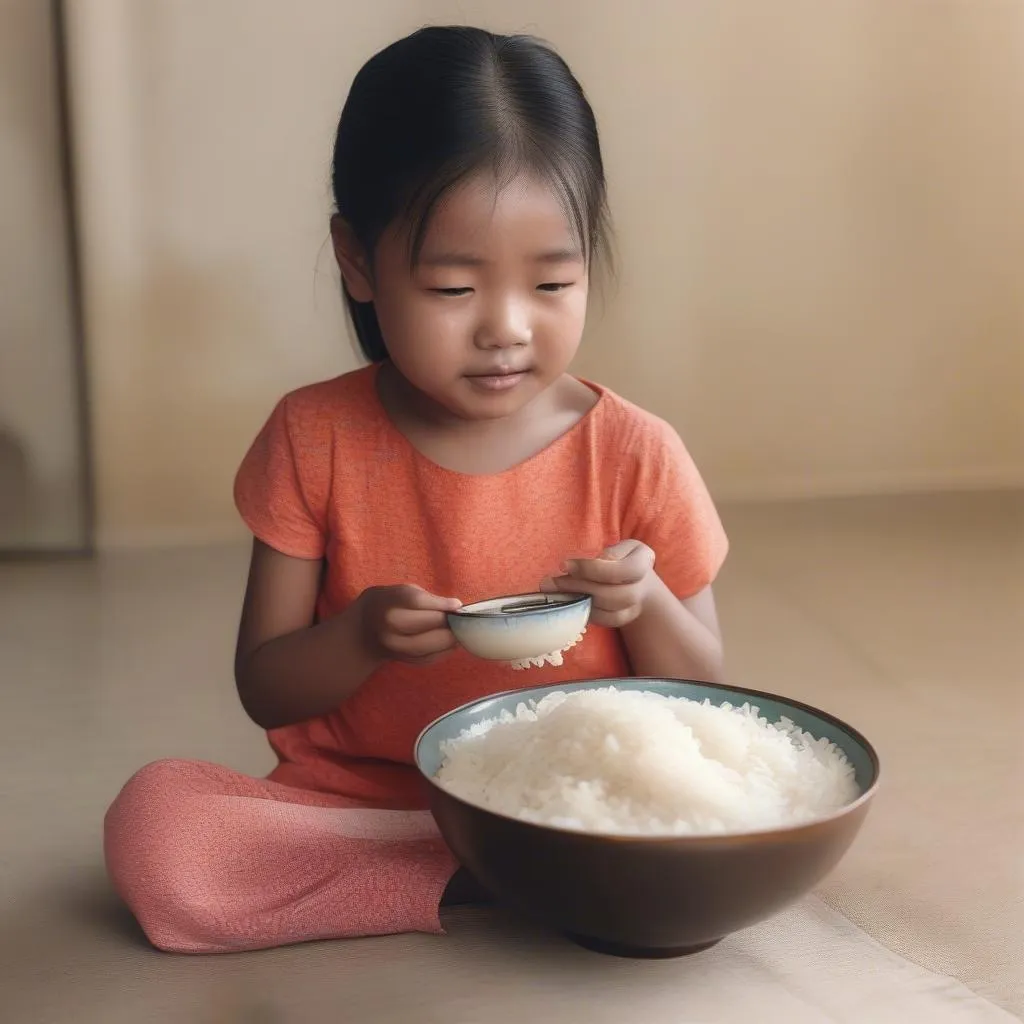“Like father, like son” – this Vietnamese proverb partly reflects the influence of parents and family on a child’s development. Beyond genetics, nutrition plays an incredibly important role in nurturing a healthy, intelligent, and potential-filled future generation. And for preschoolers, the “golden age” for forming and developing life skills, providing enough essential nutrients is absolutely crucial.
Why is Nutrition Important for Preschoolers?
Imagine a young child’s body as a beautiful garden, and nutrients are the essential nourishment for the plants in the garden to grow lush and green. If lacking essential nutrients, the plants will be stunted and lifeless. Similarly, if preschoolers are not provided with enough essential nutrients, their bodies cannot develop healthily, and their brains will also be limited.
According to Prof. Dr. Nguyen Thi Thanh Thuy – Director of the National Institute of Nutrition, “Preschoolers need to be provided with sufficient essential nutrients to ensure comprehensive physical and intellectual development.” Prof. Dr. Thuy also emphasized that a reasonable diet will help children strengthen their resistance, prevent diseases, and optimize height, weight, and brain development.
Essential Nutrients for Preschoolers
1. Carbohydrates: A Rich Source of Energy
Carbohydrates play a crucial role in providing the main source of energy for a child’s body. Playtime, learning, and running around all require energy from carbohydrates.
Sources of carbohydrates for children:
- Rice: Rice is the main source of carbohydrates in a child’s diet.
- Bread: Bread is also a good source of carbohydrates.
- Sweet potatoes: Sweet potatoes are rich in fiber and vitamin A, making them a good choice for children.
- Corn: Corn is a source of carbohydrates and vitamin B.
2. Protein: The Building Blocks of the Body
Protein is the “building material” of the body, helping children grow taller, strengthen muscles, and enhance immunity.
Sources of protein for children:
- Meat: Beef, chicken, pork… are high-quality protein sources.
- Fish: Salmon, basa, carp… are rich in omega-3 fatty acids, which are good for brain development.
- Eggs: Eggs are a source of protein, vitamin D, and essential minerals.
- Milk: Milk is a source of protein, calcium, and essential vitamins.
3. Fats: Providing Energy and Supporting Vitamin Absorption
Fat is not the “enemy” of young children as many people think. Fat plays an important role in providing energy, helping the body absorb vitamins, and protecting internal organs.
Sources of good fats for children:
- Vegetable oils: Olive oil, sunflower oil, sesame oil… are rich in unsaturated fatty acids, which are good for cardiovascular health.
- Fatty fish: Salmon, mackerel, tuna… are rich in omega-3 fatty acids, which are good for brain development.
- Nuts and seeds: Cashews, almonds, walnuts… are rich in unsaturated fatty acids, which are good for cardiovascular health.
4. Vitamins and Minerals: Helping Children Develop Comprehensively
Vitamins and minerals play an important role in maintaining health, strengthening immunity, and developing brainpower, vision, and bones for children.
Sources of vitamins and minerals for children:
- Fruits: Oranges, tangerines, grapefruits… are rich in vitamin C, which helps boost immunity.
- Green vegetables: Spinach, kale, water spinach… are rich in vitamin A, which is good for vision.
- Milk: Milk is rich in calcium, which helps strengthen bones.
- Nuts and seeds: Cashews, almonds, walnuts… are rich in vitamin E, which is good for skin and hair.
Some Notes on Nutrition for Preschoolers
- Children should eat a variety of foods: Providing all the necessary nutrient groups is essential, but eating too much is not necessarily better.
- Limit fast food, sweets, and sugary drinks: These foods are high in sugar and unhealthy fats, which are not good for children’s health.
- Children should eat several small meals a day: Eating several small meals will help children absorb food better and avoid feeling too full or too hungry.
- Create healthy eating habits for children: Children should be involved in preparing meals and choosing foods so they can understand the importance of healthy eating.
A Story About Nutrition for Preschoolers
Today, the teacher in the “Lotus” preschool class is telling the children a story about a little bear named “Bin.” Bin is a very naughty bear, and he often eats unhealthy foods like candy and sweets… and Bin often gets sick.
The teacher asks the children: “Do you want Bin to be healthy and play with his friends?”. The children reply in unison: “Yes!”. The teacher smiles kindly and continues: “Bin listened to the teacher, ate lots of fruits and vegetables, drank milk every day, and Bin became much healthier. Bin plays with his friends every day, and Bin is very happy!”.
Conclusion
“Children are a gift from heaven,” and every parent wants their children to be healthy, intelligent, and happy. Nutrition plays an extremely important role in nurturing a healthy, intelligent, and potential-filled future generation.
Let’s join “TUỔI THƠ” in accompanying children and nurturing a healthy, intelligent, and potential-filled future generation!
 Adult feeding a preschool girl fruit, illustrating good nutrition for young children
Adult feeding a preschool girl fruit, illustrating good nutrition for young children
 Preschool girl enjoys a healthy meal, emphasizing balanced nutrition for kids
Preschool girl enjoys a healthy meal, emphasizing balanced nutrition for kids